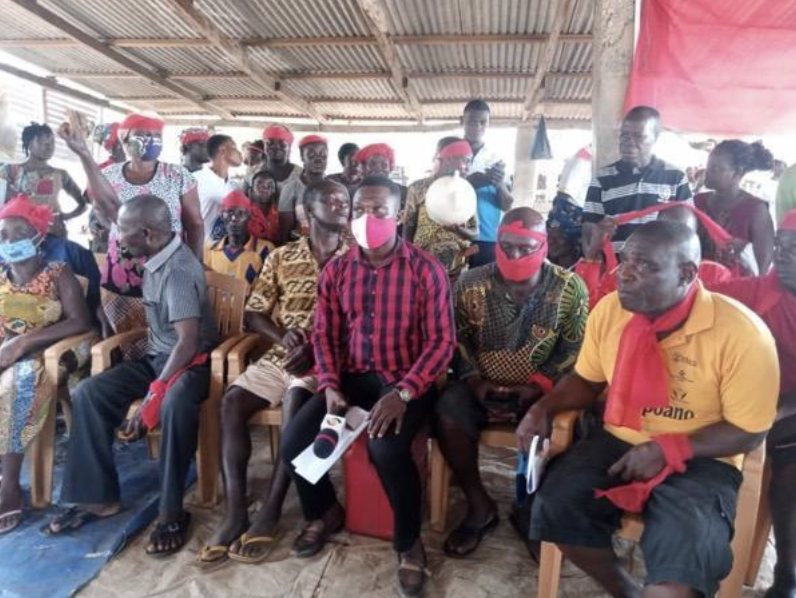The Ghana National Canoe Fishermen Council (GNCFC) is a NFA which was established in 1982. It plays a crucial role in Ghana’s fishing industry by providing a unified voice for small-scale fishermen across the country. According to its draft constitution, it concerns itself with matters affecting canoe fishers in Ghana and takes actions considered expedient to promote:
The socio-economic interests of canoe fishers;
High standards of professionalism and etiquette among canoe fishers;
Opportunities for the acquisition and dissemination of useful information among canoe fishers;
Taking of gifts, borrowing or raising money and subscribing to local or international grants for charitable purposes within the fisheries sector.
Over the years, the GNCFC has consistently represented the interests of artisanal fishers in Ghana, and currently has branches across the four coastal regions of the country. Chief fishermen serve as the leadership, and are the first point of call in the resolution of fisheries conflicts within fishing communities along the coast of Ghana. The GNCFC is increasingly leading initiatives that provide avenues for canoe fishers at the landing beaches to liaise with the government in the formulation and implementation of fisheries policies as well as advocate for reforms in the fisheries sector.
Significant actions led by the GNCFC under the Far Dwuma Nkodo Project in Ghana
Between 2017 and 2021, EJF worked in partnership with the Ghanaian NGO, Hen Mpoano, to implement the Far Dwuma Nkodo (FDN) project. Among the key objectives of the project was the establishment and strengthening of fisheries co-management structures and the enhancement of community participation in monitoring, control, surveillance (MCS) and enforcement. The project also included collaboration with the GNCFC to secure greater environmental sustainability and social equity in Ghana’s fisheries sector, by supporting efforts to reduce illegal fishing and building the capacity of fishing communities in the sustainable management of their resources.
Advocacy to end ‘saiko’
One of the most significant and successful actions of a national association under the FDN project in Ghana was the call by the GNCFC to an end of ‘saiko’ – illegal trans-shipment of fish at sea. Saiko is the local name for a particularly destructive form of illegal fishing, where foreign trawlers target the staple catch of Ghanaian canoe fishers which, once caught by the trawlers, is then transferred to specially adapted canoes out at sea and sold to the fishing communities. This was previously a practice whereby canoes would buy the unwanted by-catch of industrial vessels. However, it developed into a lucrative organised crime, where trawlers illegally targeted species which they are not licensed to fish for to sell to the local people. They were forced to buy it because, as a direct result of saiko, they were struggling to catch enough fish to sustain their livelihoods. These catches often contained juvenile fish, and had severe implications for Ghana’s small-scale fishing industry, which is critical to food security.
In 2020, the GNCFC led a joint strategy to end saiko, which included leading engagements with nine communities, and three regional dialogues which directly reached over 1300 stakeholders. Activities also included beach level protests, press engagements, a joint open letter to the President to end saiko, joint communication materials disseminated in national newspapers, and several formal and informal engagements with senior government officials.
In June 2020, the GNCFC, together with eight civil society organisations in the fisheries sector, called on the President of Ghana in an open letter to issue an urgent directive to end illegal saiko fishing. The letter emphasised that if the saiko menace was not urgently addressed and measures instituted to permanently eradicate it, the source of income for over 2.7 million Ghanaians that depend on the fisheries sector for their livelihoods would be lost. This would have large-scale, widespread negative impacts on food security, nutrition, incomes, and livelihoods, while presenting a threat to national security.
Additionally, in an effort led by the GNCFC, over 600 artisanal fishers (including women processors and traders) actively participated in a week-long silent protest against saiko at various landing beaches across the four coastal regions. These actions cumulatively resulted in a pledge of support for the campaign from the Select Committee on Food, Agriculture and Cocoa Affairs, a comment to end saiko in the 2020 budget statements, clarification from the sector Minister of the Fisheries and Aquaculture Department on the illegality of saiko, and a statement by the President of Ghana to end saiko during a radio interview.

Artisanal fishers clad in red armbands during silent protests at the landing beaches against saiko fishing.

